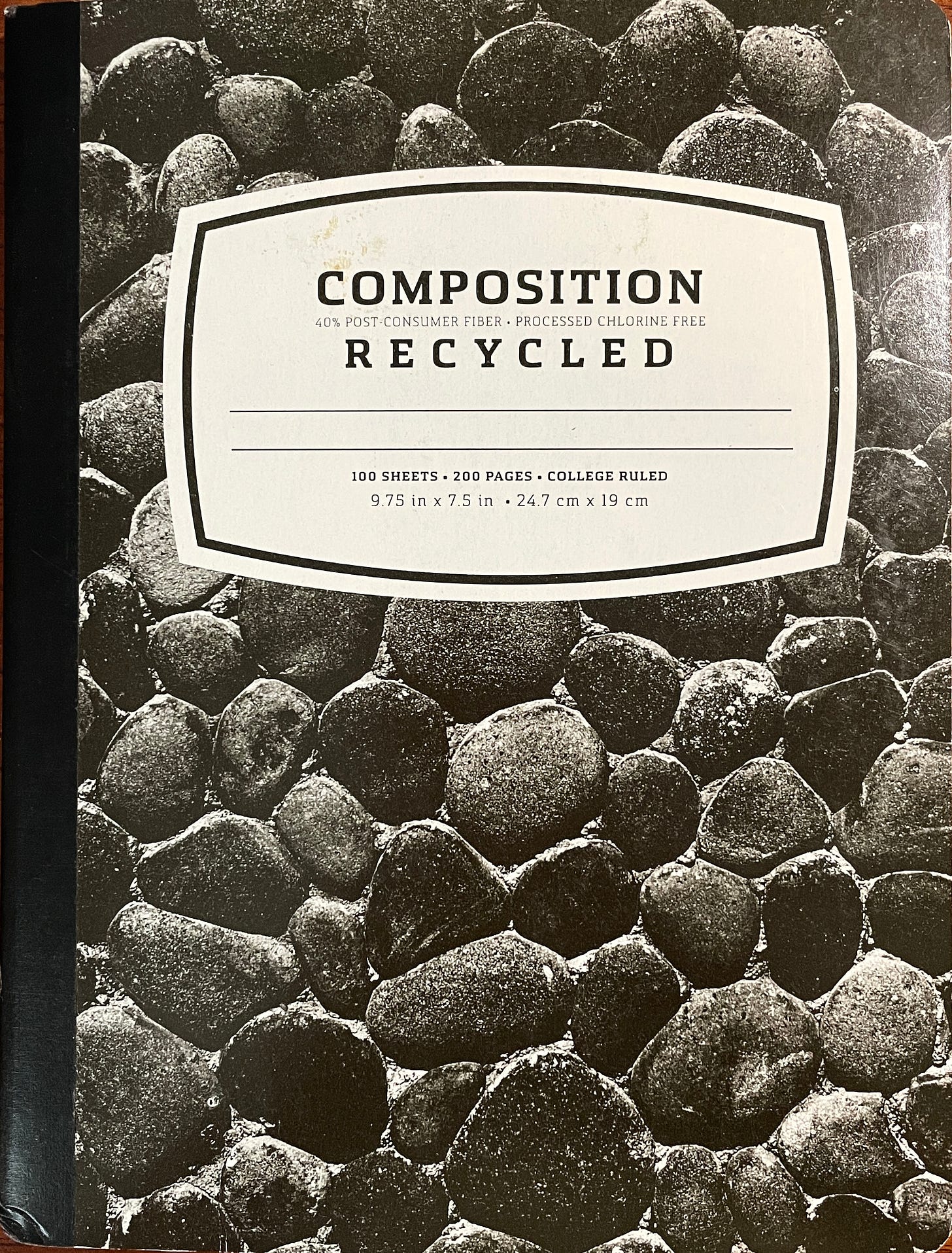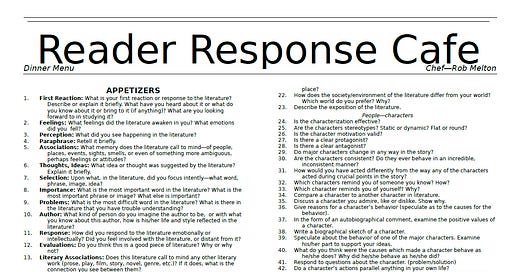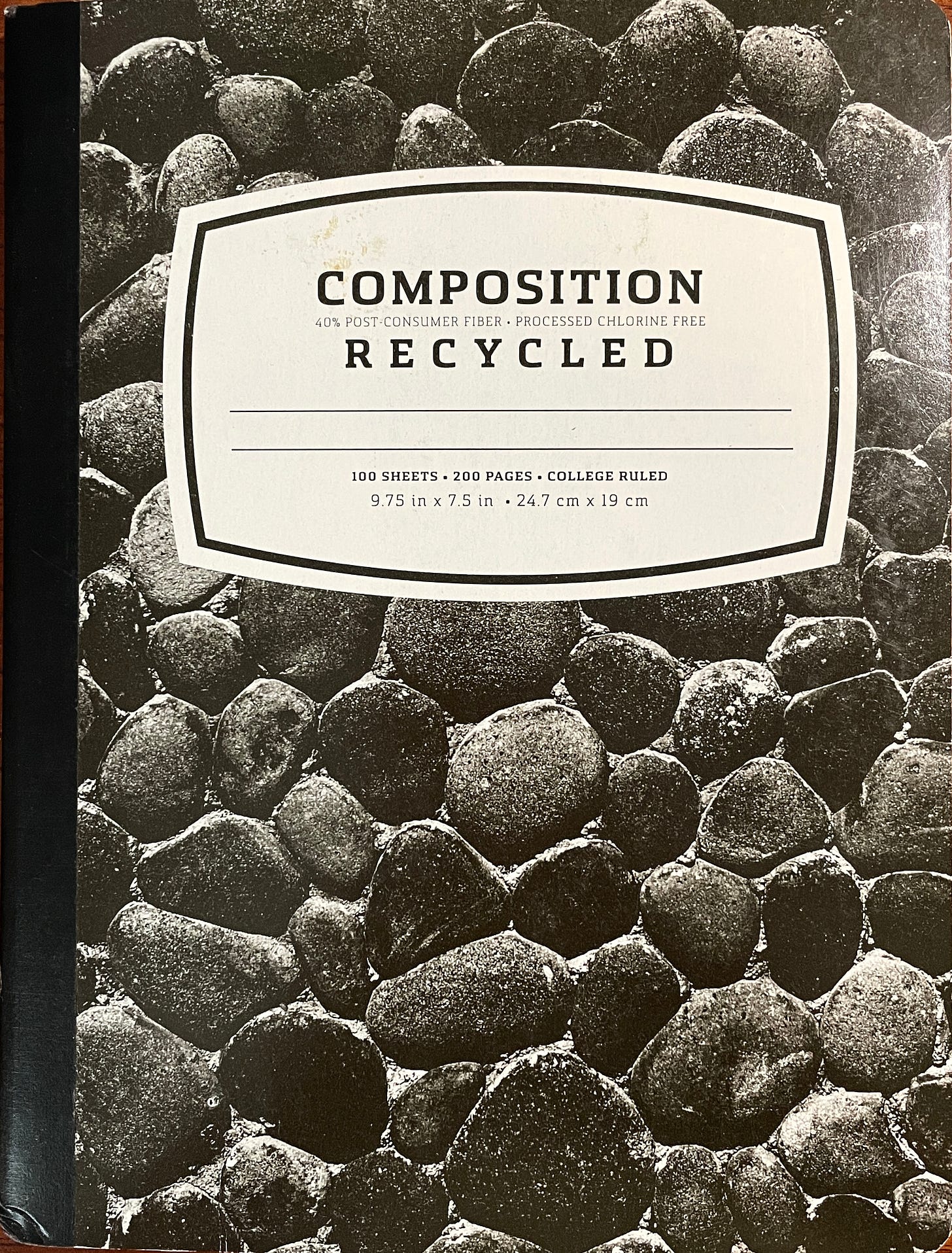
APPETIZERS
1. First Reaction: What is your first reaction or response to the literature? Describe or explain it briefly. What have you heard about it or what do you know about it or bring to it (if anything)? What are you looking forward to in studying it?
2. Feelings: What feelings did the literature awaken in you? What emotions did you fell?
3. Perception: What did you see happening in the literature?
4. Paraphrase: Retell it briefly.
5. Associations: What memory does the literature call to mind—of people, places, events, sights, smells, or even of something more ambiguous, perhaps feelings or attitudes?
6. Thoughts, Ideas: What idea or thought was suggested by the literature? Explain it briefly.
7. Selection: Upon what, in the literature, did you focus intently—what word, phrase, image, idea?
8. Importance: What is the most important word in the literature? What is the most important phrase or image? What else is important?
9. Problems: What is the most difficult word in the literature? What is there in the literature that you have trouble understanding?
10. Author: What kind of person do you imagine the author to be, or with what you know about this author, how is his/her life and style reflected in the literature?
11. Response: How did you respond to the literature emotionally or intellectually? Did you feel involved with the literature, or distant from it?
12. Evaluations: Do you think this is a good piece of literature? Why or why not?
13. Literary Associations: Does this literature call to mind any other literary work (prose, play, film, story, novel, genre, etc.)? If it does, what is the connection you see between them?
14. Writing: In writing about this literature, upon what would you focus? Would you write about some association or memory, some aspect of the text itself, about the author or about some other matter?
MAIN COURSES
Place—setting
15. What is the setting—time, place, situation, environment? How do you know? What clues of setting are provided, if any?
16. Could the literature be as effective in another setting?
17. Does the setting play a major role?
18. Is there anything universal about the setting?
19. Is there a unity of time and place, or does the story change from time to time and from place to place?
20. Of what similar scenes in other works does the setting remind you? 21. What are your feelings about the setting? Would you like to live in this place?
22. How does the society/environment of the literature differ from your world? Which world do you prefer? Why?
23. Describe the exposition of the literature.
People—characters
24. Is the characterization effective?
25. Are the characters stereotypes? Static or dynamic? Flat or round?
26. Is the character motivation valid?
27. Is there a clear protagonist?
28. Is there a clear antagonist?
29. Do major characters change in any way in the story?
30. Are the characters consistent? Do they ever behave in an incredible, inconsistent manner?
31. How would you have acted differently from the way any of the characters acted during crucial points in the story?
32. Which characters remind you of someone you know? How?
33. Which character reminds you of yourself? Why?
34. Compare a character to another character in literature.
35. Discuss a character you admire, like or dislike. Show why.
36. Give reasons for a character’s behavior (speculate as to the causes for the behavior).
37. In the form of an autobiographical comment, examine the positive values of a character.
38. Write a biographical sketch of a character.
39. Speculate about the behavior of one of the major characters. Examine his/her part to support your ideas.
40. What do you think were the causes which made a character behave as he/she does? Why did he/she behave as he/she did?
41. Respond to questions about the character. (problem/solution)
42. Do a character’s actions parallel anything in your own life?
43. What are your first impressions about a character? Do these change as you study the literature? How?
44. If you could talk to any character, whet would you say?
45. Which of the following tell you the most about a character: What a character does? What a character says or thinks? What others say about the character? How others react toward the character? What the author tells you about character? Support with specific examples.
46. How is a character responsible for what happens to himself or herself?
47. Write an interior monologue for one character in one scene.
48. Choose two characters to compare and contrast.
49. Brainstorm, cluster or map a character.
50. Write a detailed physical description of a character.
51. Discuss actors appropriate for characters in a film version.
Plot—conflict
52. What are the internal conflicts? How are they resolved?
53. What are the specific external conflicts (man vs. man, man vs. nature, man vs. himself, man vs. machine, man vs. fate, man vs. society, etc.)? How are they resolved?
54. What is the main problem the protagonist faces? What is his/her most important decision? Is it a good one?
55. What is the source of conflict? Is there more than one conflict?
56. Discuss major complications in the rising action.
57. What is the climax of the story?
58. What happens during the falling action? Why is it important?
59. Make a diagram of the plot.
60. Is there adequate suspense or tension in the story or does your interest lag? Where? Why?
61. Compare and contrast things that happen in the plot with your own experience or with plot events in other works.
62. Concisely summarize what happens in the plot.
63. Predict what might happen next. Explain why.
64. Comment on the structure of the plot.
Point—theme
65. What general truth does the author seem to be stating about human nature?
66. Discuss the theme(s) of the literature.
67. Do you agree with the author’s feelings about humanity?
68. Does this work contain a message, lesson or moral?
69. Discuss an idea/thesis in the literature you like or dislike.
70. Give your interpretation of one of the themes.
71. Argue about ideas presented in the work.
72 Defend the different ideas presented in the work.
73. Explain how you infer a theme from the literature.
Perspective—style
74. Do any of the incidents seam contrived and false?
75. What parts are realistic or effective? Why?
76. Is the work realistic, naturalistic, romantic, surrealistic, etc.?
77. What is the author’s philosophy of life as reflected in the work?
78. What is the work’s view of the nature of man, the universe, society?
79. What ideas in the literature remind you of other works?
80. How do the ideas/theses of the work remind you of your own life and philosophy?
81. Choose a passage you think is important and reflect about its meaning (reflection).
82. Choose a short passage to analyze for style.
83. Write a short passage describing the style of the work.
84. What are the key elements of this author’s style? Give examples.
85. Compare/contrast this author’s style with another’s style.
86. Discuss, using concrete examples, the author’s diction.
87. Discuss, using concrete examples, the author’s syntax.
88. Discuss, using concrete examples, the author’s use of dialogue.
89. Find and discuss effective figures of speech (simile, metaphor, personification, hyperbole, paradox, pun, etc.)
90. Find and discuss effective examples of versification (alliteration, consonance, assonance, onomatopoeia, rhyme, repetition).
91. Find and discuss effective examples of imagery (appeal to the five senses).
92. Defend the author’s point of view (1st, 2nd, 3rd person). What is it? Why is it effective? What are its limitations, if any?
93. What is the author’s tone? Is it effective and appropriate?
94. Find examples of symbolism in the literature.
95. Discuss the atmosphere and mood of the literature.
96. Discuss the use of irony in the literature. Look for dramatic, verbal and situational irony.
97. Find examples of foreshadowing in the work.
98. Find and explain allusions in the work.
99. What do you like or dislike about this author’s style?
100. What is your favorite passage in the work? Copy and discuss.
DESSERTS
101. From what you know about the work, speculate and make predictions about its outcome.
102. Interpret an important passage chosen by the teacher.
103. List questions about puzzling passages.
104. Copy your favorite passage from a section of the literature and comment upon it.
105. Discuss the relevance of a passage to the present or your own life.
106. Discuss the importance and relevance of the title.
107. Discuss the genre of the work. Compare/contrast to other works of the genre.
108. Discuss the contents of a passage in relation to its historical context.
109. Summarize class discussions.
110. Evaluate the work as a whole. How do all aspects work together? What doesn’t work?
111. Reflect upon the learning gained frog studying this work of literature. How has it changed your attitudes, ideas, insights, etc.
112. Reflect upon the work you have written in your log related to this literature.
113. What changes would you suggest for this piece of literature?
114. What questions would you like to ask the author?
115. Write about this work for different audiences.
116. What feelings did you experience in your study of this work?
117. Write a scene that could be added before during or after the work.
118. Speculate on what might happen in a sequel or prequel.
119. Relate the work to your own life.
120. What do you like most about this literature?
121. What do you like least about this literature?
122. Create your own response item and complete it.
123. Create a “Dialectical Journal.”
124. Create essay test items using the “key” words for essay tests. Answer these or exchange with another student for answers.
125. Create graphic interpretations of the literature.
126. Create audio or video cassettes related to the literature for presentation in class.
127. Create group presentations, speeches, or readings.
128. Create a fortune line graphic of one of the characters.
129. Create a plot line graphic of key events in the story.
130. Create parodies or satires of works of literature.
131. Create letters to and from characters or authors. Write an advice letter to a character or author after studying a work.
132. Create children’s books from the original or from themes.
133. Would you recommend this book to others? To whom? Why?
134. How have you grown in knowledge or emotion from this work?
135. Create a storyboard and screenplay treatment for a film based on what you read.
136. Create a contemporary greeting card using a quote, interesting use of type, and/or a drawing/photograph.
137. Create a poster illustrating a line or passage.
A journal is public writing; therefore, you may occasionally be asked to share with others. Keep this in mind if you choose to write about personal or sensitive topics.
*Based on Elements of Narrative by Portland Public Schools teachers
The 8.5x11 sheet is designed to be folded and inserted inside a composition notebook or pocket folder.
And yes, since you asked, in August I would buy 50-100 journals and folders when they were on sale for $1.00 or less for my students. It was a part of our family budget that month. And yes, it was worth every penny!
(Permission is granted for the distribution of these tools and for unlimited reproduction.)
Elements of Narrative: The 5P's
This teacher-created overview of the elements of narrative makes it ideal for teaching students how to identify each of the five elements a writer has chosen to use for a given work, whether fiction or nonfiction. Each of the readings has a quiz and an activity (aka “test”) to demonstrate they have mastered the content of this handout. Then there is a w…
a
Elements of Poetry
Units of study are organized around genres, so of course each unit begins with a reading and a quiz about the breadth and depth of the genre. I’ve been fortunate to have found documents that served this purpose well, as well as receiving permission and support to use and adapt it in my classroom. When I haven’t found such documents, I…
Elements of film
Based on the book by John Golden as well as a workshop for PPS educators he presented at Grant H.S., Portland, Ore.













This can also be used for reading circles or book clubs.